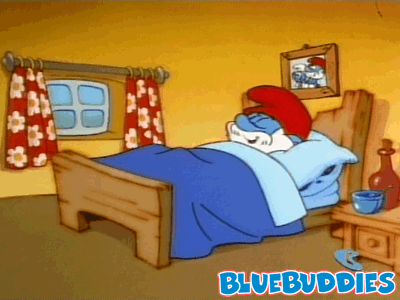On my recent post about the importance of a complete sleep and Tips on how to have a good night sleep has inspired me to give you now the importance of 'Nap'.
Nap is a short sleep, especially during the day.
The 'Nap' Stages:
The Nano-Nap: 10 to 20 seconds
Sleep studies have yet to conclude whether there are benefits to these brief intervals, like when you nod off on someone's shoulder on the bus.
The Micro-Nap: 2 to 5 minutes
Shown to be surprisingly effective to shedding sleepiness.
The Mini-Nap: 5 to 20 minutes
Increases alertness, stamina, motor learning and motor performance.
The Original Power Nap: 20 minutes
Includes the benefits of the micro and the mini, but additionally improves muscle memory and clear the brain of useless built-up information, which helps in developing long term memory (remembering facts, events and names).
The Lazy Man's Nap: 50 to 90 minutes
Includes slow-wave plus REM sleep; good for improving perceptual processing; also when the system is flooded with human growth hormone, great for repairing bones and muscles.
There are times that we really cannot get enough sleep because of busy lifestyle. We tend to work overtime to cope-up with debt and all that. More often than not we suffer the consequences and we forgot the importance of a complete sleep.
I found these article which is good for those who lacks of sleep but still want to be alert and maintain stamina without the help of caffeine or energy drinks.
According to a research on napping by Dr. Sara Mednick of the Salk Institute for Biological Studies, the beneficial nap is the 20-minute nap which can improve alertness and stamina.
Less than this period, said Mednick, has minimal benefits to the brain and other body functions while longer naps, like the 50 to 90 minute nap, eat up more time from being productive. Thus, the latter ind of nap is usually called "The Lazy Man's Nap."
Mednick suggested that once should maintain the 20 minute nap in order to avail of the power nap, as there could be pitfalls in napping for longer periods. Mednick's research also reveals that one can experience sleep inertia or grogginess when he exceeds the 20 minutes or when he reaches the Stages 3-4 or the entry towards a deep or dreamless sleep that can lead to Stage 5 sleep or Rapid Eye Movement (REM), when the eyes twitch and dreaming becomes intense.
Mednick's most recent research also shows that power naps can lift productivity and mood, lower stress, and improve memory and learning.
So, the next time the boss sees you dozing off, tell him you're just powering yourself up!
Showing posts with label Power Nap. Show all posts
Showing posts with label Power Nap. Show all posts
Sunday, June 1
Saturday, April 12
A GOOD NIGHT SLEEP!

Why sleeping is good for you?
Sleep is one of the most fundamental functions of life. It lets the body rest, and restores its energy level.The age of cable tv, 24 hour convenience stores, internet and graveyard shift workers has produced a culture of sleep-deprived citizens who consider sleeping as a waste of valuable time and money.
There are different researches that has done to explain why sleep is good for you.
OUr body clock, also called circadian clock, is our inner time-keeping, temperature-fluctuating, enzyme-controlling device that sends us messages that it's time to rest and turns-off many of the bodily processes that make us feel awake.
Sleep help us grow. Important hormone production is regulated during sleep. The skin also benefits from good sleeping habits because tissue repair occurs during snoozing.
When we sleep, blood flow is redirected more to our muscles than our brains, restoring physical energy.
In sleep, we process emotions, retain memories and relieve stress. The brain processes the day, making connections between events, feelings and memories - helping you remember things better.
Research also shows that immune functions increase during deep sleep.
Worsening of blood pressure and cholesterol is attributed to lack of sleep, increasing the likelihood of heart disease and stroke.
But some people find it hard getting a good sleep.
One in four people suffers from a stress-related sleep disorder. These disorders fall into three categories:
* Transient Insomia, which usually lasts from between 3 to 4 days.
* Short-term Insomia, which lasts from 7 to 14 days.
* Chronic Insomia, which lasts for 3 weeks or more.
Whether you have an inability to fall asleep or stay asleep, sleeping pills are not the only solution.
Tips or a good night Sleep:
1. Avoid drinking alcohol or caffeine for at least 2 hours before going to bed. A mug of warm milk at bedtime will help send you to sleep.
2. Try to eat sleep-inducing foods such as bananas, figs, dates, yoghurt, tuna, wholegrain crackers and nuts. Avoid sugar, cheese, chocolate, potatoes, pork, spinach and tomatoes at bedtime.
3. Keep your bedroom well ventilated and comfortably cool. Place orchids or aloe vera - plants which produce more oxygen at night - in bedrooms.
If everything else fails try to read books or change your positon in bed these will give you new way to stretch your body and new things to look at. Because we always tend to sleep at the same area and position in bed, seeing the same thing and we get to used of that which might lead to boredom and then sleeplessness.
So Have a good night sleep tippers!
Subscribe to:
Posts (Atom)
Featured Post
-
This song just came-out of my mind from nowhere. Early this morning, I felt fearful & worried of something I don't know why. Talk...
-
Avida San Lazaro Condominium for Rent CONDO for Rent: - Studio Type (23 sq. m.) - Avida San Lazaro - Semi-Furnished (AC, R...
-
For some including me, I don't wear my so called 'in-style' clothes in an ordinary day or when I'm just going to work. Mo...



